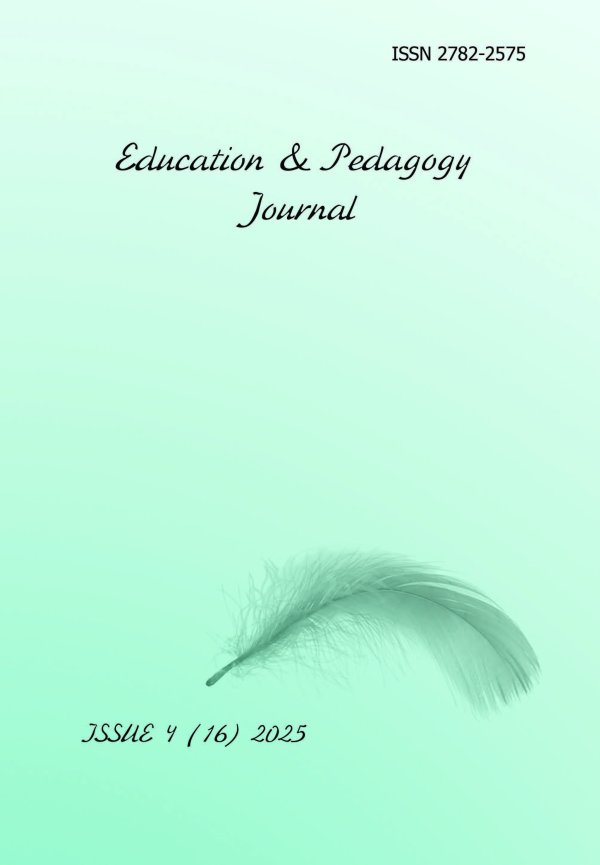Редакционная политика
- Тематика журнала
- Разделы и направления
- Рецензирование
- Периодичность
- Политика свободного доступа
- Публикационная Этика Издания
Тематика журнала
Научный журнал “Education & Pedagogy Journal” ставит целью сделать взаимно-доступными результаты научных изысканий и практической деятельности в области педагогики и психологии образования для зарубежных и российских специалистов
Разделы и направления
Рецензирование
- Рукописи, поступающие для опубликования в журнале, проверяются на соответствие техническим требованиям и соответствие профилю журнала. Материалы, не соответствующие этим условиям, возвращаются авторам с указанием причин отказа в приеме рукописей. Поступающие статьи проверяются на наличие заимствований с помощью интернет-сервиса «Антиплагиат». Поиск производится по тарифу "Full".
- Статьи, принятые редакцией, распределяются по рубрикам в соответствии с научными направлениями, по которым специализируется журнал. Информация о статьях, принятых редакцией, размещается на сайте журнала.
- Все рукописи, поступающие в журнал, направляются по профилю научного исследования на рецензию членам редакционной коллегии. По согласованию с главным редактором или его заместителями, они направляют статьи внешним рецензентам, в качестве которых выступают ученые как томских, так и иногородних вузов и научных организаций.
- Рецензирование проводится конфиденциально. Автору рецензируемой работы предоставляется возможность ознакомиться с текстом рецензии. При получении положительной рецензии, без замечаний, она принимается к печати, о чем сообщается автору. Если статья в целом оценена положительно, но имеются отдельные замечания, автору высылается рецензия и статья возвращается на доработку.
- В случае получения отрицательного отзыва, автору направляется мотивированный отказ. Фамилия рецензента при этом не указывается и дальнейшие контакты автора и рецензента осуществляются через редакцию журнала. Редколлегия предоставляет по запросам авторов и экспертных советов ВАК рецензии рукописей. Рецензии хранятся в издательстве и в редакции издания не менее 5 лет.
- Краткие сообщения, письма в редакцию, рецензии, дискуссионные материалы, персоналии и т.д. проходят только первичную экспертизу членами редколлегии в соответствии с научными направлениями и на внешние рецензии не направляются.
Периодичность
Периодичность издания: 4 выпуска в год.
Политика свободного доступа
Журнал «Education & Pedagogy Journal» публикует статьи на условиях открытого доступа в соответствии с лицензией Creative Commons Attribution license CC BY-NC-ND. В соответствии с правилами лицензии, за авторами остаются следующие права:
- право включать текст статьи, полностью или частично, в другие работы авторов с обязательной ссылкой на публикацию в журнале "Education & Pedagogy Journal";
- право всех, включая авторов, использовать текст статьи, полностью или частично, для некоммерческих целей с обязательной ссылкой на публикацию в журнале "Education & Pedagogy Journal";
- право размещать окончательную версию статьи на личных сайтах, в институциональных и/или централизованных архивах, на других электронных серверах с обязательной ссылкой на публикацию в журнале "Education & Pedagogy Journal" с указанием номера журнала и даты публикации.
Публикационная Этика Издания
Редколлегия журнала "Education & Pedagogy Journal" в своей работе руководствуется принятыми международным сообществом принципами публикационной этики, отраженными в рекомендациях Комитета по этике научных публикаций (Подготовка и издание научного журнала. Международная практика по этике редактирования, рецензирования, издания и авторства научных публикаций: Сборник переводов / Сост. О.В. Кириллова. Перевод можно найти здесь (Committee On Publication Ethics (COPE))), а также использует ценный опыт авторитетных международных журналов и издательств. Каждый член редколлегии, автор, рецензент, издатель, а также организации, принимающие участие в издательском процессе, обязаны соблюдать этические стандарты, нормы и правила и принимать все разумные меры для предотвращения их нарушений во избежание недобросовестной практики в публикационной деятельности (плагиат, изложение недостоверных сведений, фабрикация, фальсификация, конфликт интересов и др.). Соблюдение этих принципов носит обязывающий характер, так как способствует повышению качества издания, обеспечению прав авторов на интеллектуальную собственность,исключает возможность неправомерного использования авторских материалов в интересах отдельных лиц, поддерживает доверие к журналу со стороны научного сообщества и общества в целом.
- Публикации и авторские права: - каждая публикуемая в журнале статья должна содержать список источников (референсы), указание на имеющуюся финансовую поддержку исследования; не должна содержать плагиат или заведомо фиктивные данные; не должна по содержанию повторять уже ранее опубликованные в других источниках результаты.
- Ответственность авторов: - авторы обязаны участвовать в процессе рецензирования статей; - в публикации должны быть указаны все авторы, принявшие значимое участие в публикуемом исследовании; - в публикации должно быть указание на то, что все данные в публикации реальные и правильные; - все авторы обязаны при необходимости предоставлять поправки и исправления ошибок.
- Рецензирование / ответственность рецензентов: - рецензирование должно быть объективным. Рецензенты избегают конфликтов интересов в связи с рецензируемыми исследованиями, авторами, и/или спонсорами исследований. Рецензенты обязуются указывать авторам на релевантные публикации, не отмеченные в публикации. В отношении всех рецензируемых статей и материалов должен сохраняться принцип конфиденциальности.
- Ответственность редакции издания: - редакционная коллегия и главный редактор обладают правом и ответственностью принимать или отказывать в публикации статей и/или других материалов в журнале. Редакционная коллегия и главный редактор избегают конфликтов интересов при принятии/отказе к публикации статей. Редакционная коллегия и главный редактор принимают все меры к публикации и обнародованию исправлений и опровержений в случае обнаружения ошибок. Редакционная коллегия и главный редактор обязуются сохранять анонимность рецензентов. Редакционная коллегия и главный редактор выносят справедливые и беспристрастные решения, независимые от коммерческих интересов и обеспечивать справедливый и соответствующий процесс рецензирования. Редакционная коллегия и главный редактор принимают редакционную политику, поощряющую максимальную прозрачность и полную, честную отчетность. Редакционная коллегия и главный редактор охраняют целостность публикуемых записей, выдавая при необходимости исправления и отказы, и преследуя подозреваемых в исследовательских или издательских проступках. Редакционная коллегия и главный редактор обязуются пресекать неэтические проступки рецензентов и членов редакции. Редакционная коллегия и главный редактор обязуются критически оценивать этические нормы проведения исследований на людях и животных. Редакционная коллегия и главный редактор, а также рецензенты и авторы адекватно осведомляются о том, что от них ожидается.
- Вопросы этики публикаций: - редакционная коллегия и главный редактор осуществляют мониторинг и применение вышеупомянутых аспектов издательской этики, и препятствуют вмешательству коммерческих интересов в интеллектуальные права и этические нормы.
Редакционная коллегия и главный редактор проводят политику в части регулирования редакционных конфликтов интересов, соответствующую международным конвенциям и практикам, в частности Коду Этики Публикаций COPE (Committee On Publication Ethics (COPE))




